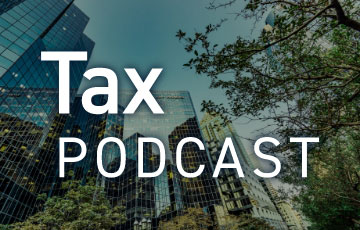Climate change, particularly in the industrial sector, remains an important issue in the upcoming U.S. presidential election and there is speculation that a Republican win in November could lead the nation further away from the 2050 net-zero carbon dioxide emissions goal. Regardless of the victor, certain sustainability laws are likely to remain constant, particularly at the state and international level, as well as within the private sector.
While it’s generally assumed there will be cuts to President Joe Biden’s climate policies if former President Donald Trump is to take office, certain policies in process are generally expected to move forward as planned.
Additionally, as onshoring and nearshoring have now become a bipartisan effort, we can likely expect efforts to move manufacturing operations and jobs closer to home no matter the outcome of the election.
Cherry Bekaert’s sustainability professionals look ahead to November for potential post-election outcomes and possible impacts on environmental regulations for industrial manufacturing. While no one can fully predict future scenarios, and policies are always subject to change, awareness of possible fluctuations in the Environmental, Social, and Governance (ESG) space can help your business better prepare for sustainability requirements.
Federal Influence on Sustainability Initiatives
In March, the U.S. Securities and Exchange Commission (SEC) adopted rules to standardize climate-related disclosures for public companies. Registrants are now required to provide climate-related disclosures in annual reports and registration statements. The rules assert that in the footnotes to the financial statements, registrants must provide information on:
- Effects of severe weather events and other natural conditions
- Certain carbon offsets and renewable energy certificates (RECs)
- Material impacts on financial estimates due to severe weather events and other natural conditions or disclosed climate-related targets
While the SEC temporarily paused the adoption of these rules, pending review in the Eighth Circuit, implementation is expected to continue forward as intended, as the SEC is independent from the federal government. However, there may be more delays if we see a second Trump presidency and further changes to White House administration.
Federal legislation surrounding carbon reporting is, of course, subject to change based on the current administration’s priorities. While President Biden set ambitious energy goals, including achieving a carbon pollution-free power sector by 2035, Trump has been vocal about rolling back certain existing regulations and will be less likely to introduce new ones were he to take office once again. But individual states have started to introduce their own regulations on what they want to see around sustainability and carbon reporting.
Even if the future brings a less climate-focused administration, state laws and voluntary corporate initiatives around sustainability will continue to be introduced. Businesses may find themselves navigating varying standards depending on operating locations, which could complicate compliance efforts and increase operational costs.
International Pressures on U.S. Manufacturing
While federal regulations undoubtedly impact manufacturers nationwide, international regulations may have a more long-lasting influence on sustainability requirements, especially for multinational corporations.
Many American companies with business in Europe have established European entities to serve as the companies’ tax beachhead, meaning those entities are subject to European reporting requirements, which are generally much more advanced than U.S. requirements.
The International Sustainability Standards Board (ISSB), a standard-setting body under the International Financial Reporting Standards (IFRS), also serves as a guide for the global economy.
The ISSB has developed a framework for sustainability reporting standards with the goal to create a comprehensive global baseline. Standards IFRS S1 and IFRS 2 went into effect on January 1, 2024, and will serve as a future guide for U.S. standard setters. Increasingly, U.S. companies are encouraged to begin following ISSB standards since they will likely need to be compliant with them at some point. Aligning with the ISSB may also help companies avoid double reporting, as both the SEC and sustainability-focused states like California have begun to align their standards with the ISSB.
The United Nations Principles for Responsible Investment (UN PRI) is another international framework with influence in the U.S., as there is increased pressure for companies to become signatories and comply with carbon reporting requirements.
These international influences will not be impacted by the election and will continue to affect ESG in U.S. manufacturing. Companies can be proactive and begin to prepare for changing requirements now, rather than waiting for an implementation deadline.
State-Level Sustainability Efforts
Without nation-wide regulation on corporate sustainability and reporting, state laws have the opportunity to drive corporate regulatory policy in the U.S. Regardless of federal stance, states like California will continue to lead on carbon reporting and sustainability initiatives.
Enacted late last year, California’s new carbon reporting rules promote sustainability and greenhouse gas emission reduction for certain companies. Also referred to as the California Reporting Bills, the laws have been delayed due to a recent amendment proposed by Governor Gavin Newsom to extend corporate compliance deadlines. The amendments are currently under review with the California State Senate.
Additionally, New York Senate Bill S897A, which intends to establish climate corporate data accountability, is now moving through the New York State Senate Finance Committee and expected to pass. State requirements will likely remain and continue to be introduced in the absence of nationwide regulation. Persistent state-level regulation will influence local companies, as well as national and international businesses operating within the state.
Corporate Sustainability Practices
The push for sustainability in the corporate world is driven by a combination of market forces, investor demands and consumer preferences. As such, large corporations increasingly view sustainability as integral to their business strategy and often require suppliers to provide detailed carbon disclosure forms.
For example, companies like Apple and Walmart have robust supplier sustainability programs that demand transparency in carbon emissions and other environmental impacts. This practice will continue independent of federal regulations or who takes office next January. Additionally, many of the companies covered by California’s climate disclosure rules are multinational corporations and large tech companies, including Google, Microsoft, Chevron and Costco.
Numerous larger corporations have spent years preparing for mandatory disclosure requirements. Corporate policies can create a ripple effect and compel smaller suppliers to adopt enhanced reporting practices to maintain their business relationships.
How Cherry Bekaert Can Aid Your Sustainability Efforts
While the presidential election will undoubtedly have influence over the direction of national sustainability regulations, international standards, state-level rules and corporate initiatives will continue to drive significant progress. Understanding compliance requirements in various locations, as well as timelines to adhere to new regulations, is crucial for future success.
Our sustainability professionals are equipped to guide your business forward and assist with compliance program requirements. Along with carbon calculations, we can help you develop a strategic roadmap to:
- Assist with the creation of your plan to be more sustainable and forecast improvement
- Lower costs by outsourcing to a sustainability team rather than insourcing your efforts
- Understand and help mitigate sustainability risks to your plan
- Identify and assist with statutory tax credits and other benefits to pay for your sustainability program
Related Insights:
- Article: Seize the Opportunity Around California and the SEC's New Carbon Reporting Requirements
- Article: Carbon Accounting Frequently Asked Questions (FAQs)
- Alert: SEC Finalizes Climate Disclosure Rules: Enhancement and Standardization of Climate-Related Disclosures for Investors
- Article: Yes, Carbon Neutrality Can Drive Profitability
- Article: Regionalization and Carbon Neutrality Strategies Positively Impact Manufacturers
- Case Study: Going Green: How a Manufacturer Can Drive Profits While Reducing Carbon Footprint
- Article: IRS Continues to Issue Guidance for Implementing Clean Energy Tax Credits
- Webinar: California’s Climate Disclosure Laws Are Coming: What it Means for Your Company and How it Can Be a Competitive Advantage






